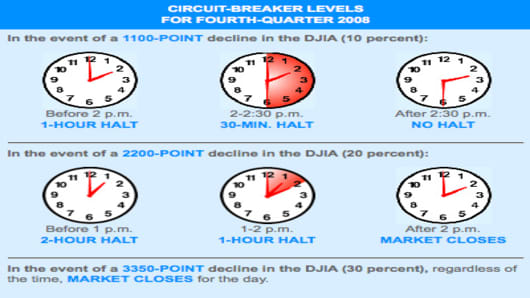The Dow pared its massive loss in the final hour of trading Monday after fear that the credit crisis is spreading rippled through world markets.
It was a wild ride for the Dow Jones Industrial Average, which fell straight out of the gate this morning, breaching 10,000, then 9,900 and so on. The blue-chip index ended down just 369.88, or 3.6 percent, at 9955.50, after being down as much as 800 at one point. It was the first time in four years that the Dow has closed below 10,000.
To put the Dow's day in perspective, at its lowest point today, the index was still 300 points from the first circuit-breaker trigger levelannounced by the NYSE last week. According to the fourth-quarter guidelines, an 1100-point drop in the Dow before 2 p.m. will halt trading for one hour, a 2200-point drop before 1 p.m. will stop trading for two hours, and a 3350-point drop will shut down trading for the rest of the day, regardless of what time it occurs.
"We'd actually like to see a little more panic," said Matt Cheslock, a senior specialist at Cohen Specialists. "Then you get stocks that go down and bounce," enticing buyers, he said. "Eighteen percent might seem like a discount but when you don't get a bounce it's not. The stock could go down another 2 percent," he explained.
"I’m a little frustrated and disappointed. I thought we had a great setup here for a selling climax," Art Cashin, director of floor operations at UBS, told CNBC. "We could still see a selling climax tomorrow … then turn like a cattle stampedeand roar back. That would be the kind of bottom that could last for months," Cashin said.
All 30 Dow stocks were down for most of the day but American Express and General Electric eked out gains by the closing bell.
(Track the Dow winners and losers.)
The S&P 500 shed 3.9 percent, while the Nasdaq lost 4.3 percent. The CBOE Volatility Index, widely considered the best gauge of fear in the market, soared to a record above 50, ending at 52.05. The last time the VIX closed above 51 was in 1987.
The fear sent a ripple through markets around the world: Latin American markets were at their session lows; trading was halted twice in Brazil after the index dropped 15 percent. European stock markets had their worst day in four years, with most indexes shedding 7 percent or more, amid fear that the credit crisis has spread to European banks. Asian markets also took a hit, with Japan's Nikkei 225 Average dropping more than 4 percent.



